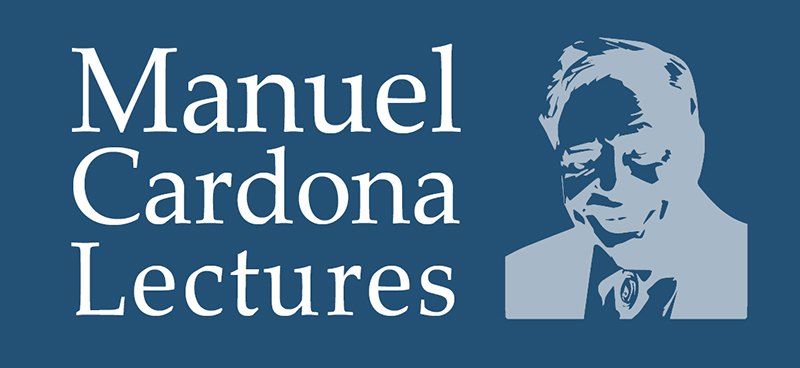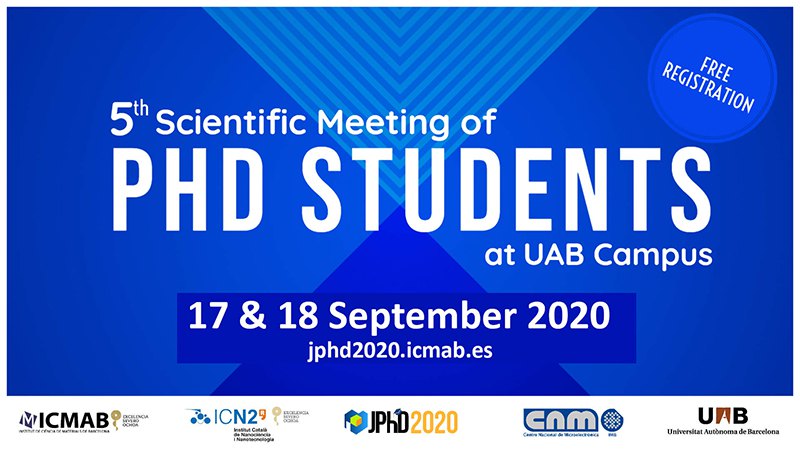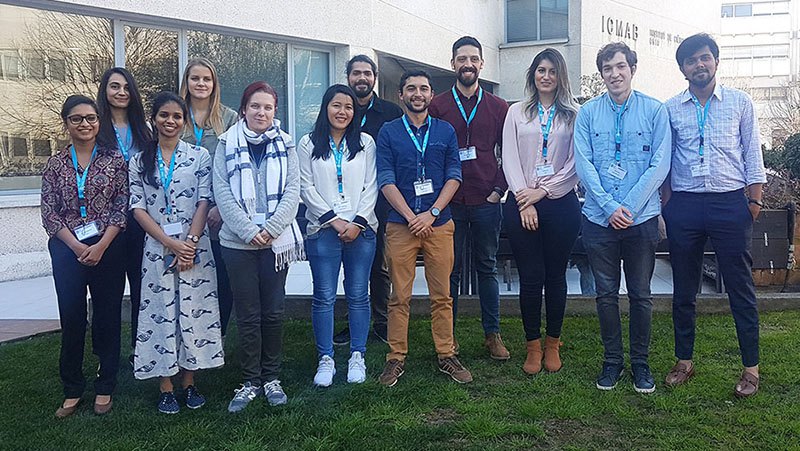Community-Building
The ICN2 also organises a series of events designed to build and consolidate community within both the ICN2 and the immediate scientific context.

Manuel Cardona Lectures
The Manuel Cardona lecture series offers the ICN2 community and beyond the opportunity to interact with some of the most prominent researchers in nano-related fields. They stand as a tribute to Prof. Manuel Cardona, a key figure in our institutional history. In 2020 we hosted two Manuel Cardona Lectures.
The first one was delivered in March by Prof. Anders Hagfeldt, Professor in Physical Chemistry at Laboratory of Photomolecular Science, Swiss Federal Institute of Technology Lausanne (EPFL), Switzerland. In a lecture entitled “Nanoscale Solar Energy Converters” the speaker presented his work on solar energy devices, providing in particular an overview of the interesting characteristics of nanomaterials for solar energy conversion. Prof. Hagfeldt had been invited by Dr Monica Lira-Cantú, leader of the Nanostructured Materials for Photovoltaic Energy group, but his seminar had to be cancelled due to the recently applied COVID-19 restrictions. It was rescheduled and became the first ever ICN2 webinar.
The second one was delivered in June by Prof. Paul S. Weiss, UC Presidential Chair, Distinguished Professor of Chemistry & Biochemistry, Bioengineering, and Materials Science & Engineering, University of California, Los Angeles, USA. His talk was entitled “Nanotechnology approaches to Biology and Medicine”. Invited by ICREA Prof. Arben Merkoçi, leader of the ICN2 Nanobioelectronics and Biosensors group, Prof. Weiss shared the most important results accomplished during his career and some of the lessons learnt along the way.
The fact that the 2020 Manuel Cardona Lectures had to be streamed online made it possible to share them live with a broader audience. The ICN2 Seminar Room is limited to around 80 seats, but the online auditorium welcomed almost 400 attendees in the first online lecture.

ICN2 invited seminars (#StayAtHome Seminars)
The ICN2 hosts regular scientific lectures by international researchers outlining their latest results in topics related to those studied at the ICN2. The ICN2 Seminars serve as a discussion forum and also as a tool to establish collaboration channels with well established and emerging national and international researchers.
In March 2020 the ICN2 Seminars switched to a fully online mode. After a quick period of transition, the #StayAtHome Seminars became an essential channel to create a shared space for the ICN2 community and keep alive the feeling of belonging to the ICN2 during lockdown.
In 2020 a total of 15 seminars were held, delivered by researchers from centres in the United States (1), Europe (7), Spain (4) and the rest of the world (3).

Who is who
This is an activity launched in 2020 by the Human Resources Department as part of the ICN2 Community activities. The objective of this initiative is to present the members of the administration departments and their roles. These online sessions go beyond the professional role of participants, who are invited to share some personal facts regarding their hobbies and personal life. The presentations, which will continue over 2021, will include all administration departments in regular sessions with the objective to bring them closer to all the ICN2 Community, especially during the COVID times when informal personal contact is scarce.

Open Knowledge Programme
The ICN2 Open Knowledge Programme started in 2014 as a means for sharing knowledge inside the ICN2 community. Each group or unit of the institute interested in participating proposes a set of seminars to address a broad topic from different angles. These talks are coordinated by the Human Resources Department, as they are part of the ICN2 Training Plan, and are recorded so that they can be viewed at any time.
Since the beginning of the programme, 9 open knowledge modules have been created, dealing with the use of photons to study condensed matter, the preparation of micro and nanostructures, the fundamentals of electronic excitations and spin dynamics in Dirac matter, nanomaterials-based biosensing systems in diagnostics, electron microscopy, nanofabrication processes and tools, a tutorial on TBtrans and TranSiesta and the implementation of spin-orbit coupling in SIESTA. The module on nanofabrication processes was updated in 2020 by Dr Raúl Pérez, Senior Laboratory Officer for the Nanofabrication Laboratory. With this talk, the Open Knowledge Programme was reactivated after a period of inactivity.

COVID-19 campaign
During the first weeks of lockdown, the ICN2 Health & Safety Area prepared, together with the Marketing and Communication Department and the Human Resources Department, an internal campaign for the prevention of the COVID-19 in the ICN2 premises. It was a necessary action when reactivation plans for each Group, Unit, Department and Area were being put into place.
The ICN2 community, when going back to their usual workplaces, found the Health & Safety campaign deployed around the building with easy-to-follow indications for preventing the spread of coronavirus. The campaign consisted of a series of posters and signals distributed throughout the ICN2. They showed some rules and tips to help us maintain health and safety measures to prevent virus transmission. The ICN2 Intranet also offered a section devoted to summarise all COVID-19 related information, realised with the support of the IT Department.

5th Scientific Meeting of PhD Students at UAB campus
The 5th Scientific Meeting of PhD Students at UAB campus (JPhD2020), organized by PhD fellows of the ICMAB, IMB-CNM, ICN2 and the UAB, was held at the UAB and IMB-CNM premises on September 2020. The event was mostly held online but it kept alive the essential objective to create an interactive environment where young researchers from around the UAB Campus could interact and establish stronger bonds.
This scientific meeting is mainly addressed to PhD students of any year who are interested in sharing their research and connecting with other research groups. Master's and undergraduate students were welcome to participate as well. The JPhD2020 included lectures from international and local professionals, presentations from fellow PhD students, a poster session and interesting hands-on tutorial workshops. The conference was a great opportunity to practice communication skills, discover different research fields, and connect with PhD students across the UAB campus.

DOC-FAM doctoral students celebrate a welcome event
DOC-FAM is an excellence DOCtoral training programme in Functional Advanced Materials awarded to the Spanish National Research Council (CSIC) in the H2020-MSCA-COFUND-2016 Call and coordinated through the Institute of Materials Science of Barcelona (ICMAB). It is developed in collaboration with several partner research Institutions from the area, four of them contributing to the co-funding of the programme: ICN2, IMB-CNM-CSIC, ALBA-CELLS and IREC.
In February, the ICMAB celebrated a welcome day to gather all 11 doctoral students hired in the second call of the Programme. It was a community building event for the young researchers joining the research institutions involved. Two of them are currently working at the ICN2: Alejandro Astúa, Doctoral Student at the Nanobiosensors and Bioanalytical Applications Group led by Prof. Laura Lechuga, and Anukriti Pokhriyal, Doctoral Student at the ICN2 Novel Energy-Oriented Materials Group led by Prof. Pedro Gómez. Both of them, with the support of their group leaders, offered a brief presentation to introduce their research. Àlex Argemí, Head of the ICN2 Marketing and Communication Department, introduced the ICN2 to the participants in the Programme.

Ping Pong Masters of Spin
On February, the Ping Pong Masters of Spin was held, an event to decide which institution between ICMAB and ICN2 hosts the best table tennis players. The event involved the champion and runner-up of ping pong tournament held at each institution.
The chosen format to determine who the “masters of spin” were was a quadrangular tournament in which the ICN2 representatives (Christian Schäfer and Saptam Ganguly) played individually against each of the ICMAB representatives (Juri Banchewski and Xavier Rodríguez). If there was a draw in the individual matches, a doubles match would resolve the tie.
In the end, it was just an activity to have some fun and gather people both from the ICMAB and the ICN2 to cheer for their teams and enjoy the show. The ICN2 clearly won the competition and all the players ended up celebrating their sportsmanship.
